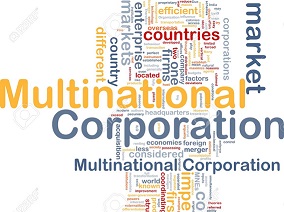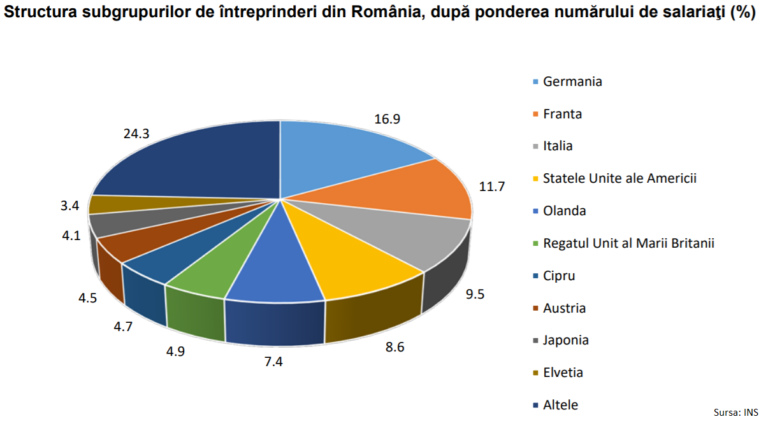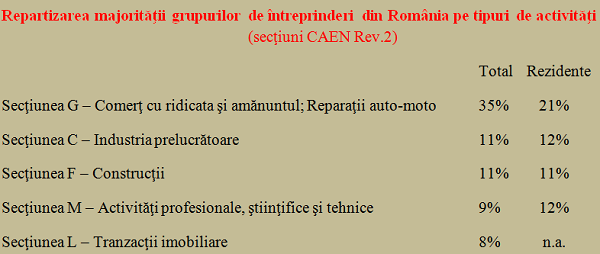 Germany (16.9%), France (11.7%) and Italy (9.5%) are the countries with the largest share in Romania’s economy by the number of employees in 80,905 groups of enterprises, according to data processed and published by INS for 2017.
Germany (16.9%), France (11.7%) and Italy (9.5%) are the countries with the largest share in Romania’s economy by the number of employees in 80,905 groups of enterprises, according to data processed and published by INS for 2017.
Along with the USA (8.6%) and the Netherlands (7.4%), they control most of the existing groups of enterprises in the Romanian economy.
It should be noted the significant changes occurred over the past two years, with increases for the US (+1.4 percentage points), France (+1.2 pp.) and the Netherlands (+0.7 pp.) and decreases for Austria (-2.8 pp., with a decline from the fourth to the eighth position), Germany (-1.6 pp.) and Italy (-1 pp.).
*
- Structure of subgroups of enterprises in Romania, by the share of employee number
- Germany
- France
- Italy
- USA
- The Netherlands
- The UK
- Cyprus
- Austria
- Japan
- Switzerland
- Others
*
Only 4,910 of the groups of enterprises have been identified as a resident by official statistics (slightly more than 6%, a level declining from 7% in 2015), while no less than 75,995 groups of enterprises have been qualified as multinational enterprises. In fact, 293 (0.38%) of them were controlled within the country and the remaining 75,702 (99.62%) from abroad.
*
- Distribution of most of the groups of enterprises in Romania by type of activity (CAEN sections Rev2)
- Section G – retail and wholesale trade; auto-moto repairs
- Section C – manufacturing industry
- Section F – Construction
- Section M – professional, scientific and technical activities
- Section L – Real estate transactions
*
Resident groups of enterprises operate predominantly in the following sections:
G – Wholesale and retail trade; Repair of motor vehicles and motorcycles – where they represent only 21%, C – Manufacturing 12%, M – Professional, scientific and technical activities – 12% (interesting, in both cases with slightly higher shares than non-resident groups) and F – Construction – 11%.
If these percentages are applied to those with which these sections are presented in total groups of enterprises, we obtain values for resident groups of companies around 7% only in trade and repairs and exceed the psychological threshold of 1% in just three areas: manufacturing, construction, and professional, scientific and technical activities.
That shows a relatively weak presence of the domestic capital in the big decisions made in the Romanian economy (for geographical and workforce-related reasons). Of course, there is a multitude of businesses that are not part of any group, which for the most part belong to Romanians. But it is not there where important decisions are made.
In the context of the advance of globalization and openness to technology and the labour organization offered by the unification of markets within the EU, the three countries that hold the most important shares in terms of groups of companies are positioned on the podium of trading partners.
Therefore, perhaps we should define governmental policies more carefully and correlated with the reality of the field. As well as distinguish between Romania’s economy, strategically dominated mainly from abroad, and the large segment of Romanian entrepreneurs, where most companies (by number) are local but with limited decision-making power.
Definitions:
Legal unit means any economic or social operator that has its own patrimony, may conclude in their own name contracts with third parties and defend its interests in court – has legal personality. Legal units are either authorized natural persons, individual enterprises, family businesses (in their capacity as entrepreneurs) or legal entities.
Control – a legal unit is controlled if another legal unit holds a percentage exceeding strictly 50% in the decision making in the shareholders general meeting, or which is contractually entitled to control.
Group – the group of enterprises connected to a group head through a real non-zero control quota
Group head – a legal unit that is not controlled, directly or indirectly, by another legal unit and controls at least one subsidiary.
Multinational group of businesses – a group of businesses consisting of at least two legal units located in different countries;
Business sub-group – the legal units (enterprises) of a group of multinational enterprises resident in the same country;
Resident group of businesses – the group of enterprises whose legal units (enterprises) are all resident in the same country.











